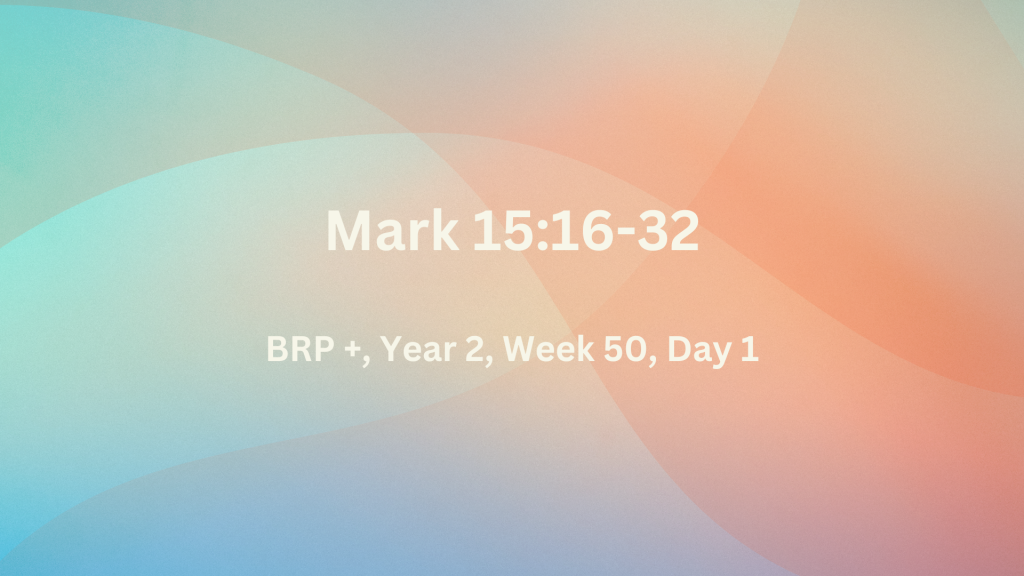Mark 15:16-32
Q.1. Did the Roman soldiers treat all their prisoners like they treated Jesus? What happened after they had finished their maltreatment? – (Mk.15:16-21)
Roman soldiers were expert killers, when it came to crucifixion. After scourging Jesus horribly in order to satisfy the crowds, Pilate handed Him to a cohort of soldiers. These protected Pilate and his officials at the palace. Some of the six hundred soldiers joined into mock Jesus for His claim to be the king of the Jews (Mk.15:2, 15-18). Condemned prisoners would not normally be flogged as Jesus was, and the context suggests that neither would they have been relentlessly mocked, spat upon, and beaten. They placed a royal purple robe on Him for effect. The translation – beating His head with a reed … is weak because that word was also used for the reed used with the wine filled-sponge they offered Jesus on the cross (Mk.15:19 c.f. Mk.15:36). It would have required a rod or staff to beat Jesus. They removed the purple robe and placed His bloodied garments back on Him. Then – they pressed into service a passer-by coming from the country, Simon of Cyrene (the father of Alexander and Rufus), to bear His cross (Mk.15:21). Rufus was known to Paul, and the reference by Mark to Simon’s two sons suggests that both became followers of Christ and were known in the early church (Rom.16:13).
Q.2. Where was Golgotha? Why did Jesus refuse the drink? What did the soldiers do after crucifying Jesus? What was His crime? – (Mk.15:22-26)
Jesus was crucified just outside the walls of Jerusalem at – … the place called Golgotha, which translated means ‘place of a Skull’ (Mk.15:22 … Latin: Calvariae or Calvary). The land formation looked like a skull. It was not far from the tomb where Joseph of Arimathea laid the body of Jesus. It was not on an inaccessible hill but on a ledge just above the road. This allowed the Jewish leaders and people to hurl abuse at Jesus (Mk.15:29-32). It was likely to be the place where God told Abraham to offer his only son on Mount Moriah, promising – In the mount of the Lord it will be provided (Gen.22: 14 c.f. Gen.22:2). That is made clear from the record of the location of the temple – Solomon began to build the house of the Lord in Jerusalem on Mount Moriah, where the Lord had appeared to his father David at the place that David had prepared on the threshing floor of Ornan (Araunah) the Jebusite (2 Chron.3:1). This had been purchased by David for fifty shekels of silver, after he said – I will not offer burnt offerings to the Lord My God which cost me nothing (2 Sam.24:24). Wine mixed with myrrh was a narcotic sedative given to drug the victims of crucifixion. Jesus refused the drink and thus felt the wrath of God and men to the full. Ignoring the pain of the suffering Jesus, the soldiers gambled for His meagre garments (Mk.15:23-24). Pilate documented the charge against Jesus – THE KING OF THE JEWS (Mk.15:26).
Q.3. How much Scripture was fulfilled at the Crucifixion? Did Jesus control these events? What was the ultimate insult of the Jewish leaders? – (Mk.15:27-32)
Mark was conscious that the death of Jesus fulfilled the Scripture. He applied the Scriptures to Jesus’ crucifixion among two criminals – And He was numbered with transgressors (Mk.15:28 c.f. Isa.53:12). Psalm 22 referred to the abandonment of Jesus (Mk.15:34 c.f. Ps.22:1); His mocking (Mk.14:65; 15:16-20, 29-32 c.f. Ps.22:7-8); His crucifixion (Mk.15:22-24 c.f. Ps.22:16), the casting of lots for His garments (Mk.15:24 c.f. Ps.22:18). Psalm 69 foretold the given of a stupefying drink (Mk.15:23, 36 c.f. Ps.69:21). Jesus, as God, ordained all that was necessary on the cross to bring salvation to sinners. However, in His humanity Jesus gave Himself into the hands of sinful men when He gave up His life for us, so thus did not orchestrate the actions done by them (c.f. Jn.10:18; Heb.10:5-10). The greatest insult from the Jewish leaders and the people, was the claim that He could not come down from the cross and save Himself. It was the pure love of Jesus that kept Him suspended between heaven and earth! (Mk.15:29-32).

